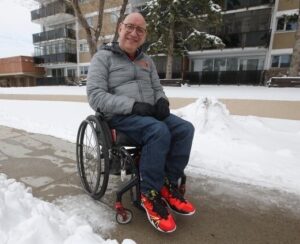For many of us, when the snow begins to fall, our hearts sink a little. The simple act of leaving the house, getting to public transit, or even reaching the end of the street becomes a challenge.
Snow often leaves people with disabilities feeling stranded. It’s all too common to encounter a cleared path, only to be met with a huge snowbank at the curb cut. Adding to these challenges, more people need to rely on parallel transit services. Higher demand means wait times and arrival times can be unpredictable. The nagging question looms: can I even get down the sidewalk?
The unpredictable nature of snow can have a significant impact on one’s mental health. The uncertainty of whether your path will be clear can lead to feelings of anxiety and helplessness, and there’s also the fear of being cut off from our workplaces, resources, and connections.
But there are things we can do to make winter a little less challenging:
Shovel Early and Often: If you’re physically able, please lend a hand and clear your walkways and driveways as soon as possible.
Advocate for Accessibility: Reach out to your local city council representative through calls and emails, and be a vocal advocate for resources for the removal of snow, particularly in urban and inner-city areas. It’s crucial that curb cuts and sidewalks are cleared properly to maintain accessibility for all.
Support Remote Work: If you work with someone who finds it difficult to navigate during snowy weather, support remote work without question. Proactively allowing employees to work from home during winter weather can ensure their safety and enable them to continue their contributions without the added challenges of snow and ice.
Gather Information: If you are an event organizer or you run a space, start by asking questions. You can add it to the event ticket or sign up. How did you get here today? This kind of information is key to identifying who is and who isn’t able to attend and what choices they made to get there.
Winter can be an isolating time for everyone, regardless of their abilities. To combat this isolation, I encourage you to reach out, join an online support group or community group, and get involved in any way that keeps you connected and a part of the community that needs you as much as you need it.
Photo: John Woods/Free Press




